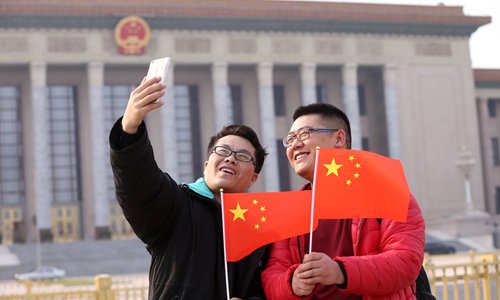HOME >> CHINA
'Two sessions' likely in late April or early May: observers
By Liu Caiyu Source:Global Times Published: 2020/3/18 18:33:23

Visitors pose for a selfie with Chinese national flags in front of the Great Hall of the People in Beijing. The hall is where China's "two sessions" are convened each year. Photo: IC
The "two sessions," annual meetings of China's top legislative body and its top consultative body, are likely to be held in late April or early May, Chinese analysts said Wednesday, since by then the domestic epidemic situation is expected to be under control and business operations should have resumed.
Usually held in early March, this year's gatherings of the National People's Congress (NPC) and the National Committee of the Chinese People's Political Consultative Conference (CPPCC) were postponed due to the epidemic.
As the country's most important political event, the "two sessions" will be held sooner or later but only when there is a major victory in the battle against COVID-19 in China, referring to the government's key emphasis of work shifting from epidemic control to normal operations in the country, Chinese analysts said. They held that the global pandemic won't have much of an impact on the two sessions.
Top Chinese epidemiologist Zhong Nanshan had predicted that late April or early May was likely to be the time when the epidemic is brought under total control in China, and considering its improving situation, it is reasonable to hold the meetings at that time, Zhuang Deshui, deputy director of the Research Center for Government Integrity-Building at Peking University, told the Global Times on Wednesday.
Zero new domestic suspected cases were reported in the Chinese mainland, including Hubei Province and Wuhan, for the first time on Tuesday, the National Health Commission reported Wednesday.
Zhuang said that "according to normal principles, overall stability is important during the 'two sessions.'" Legislators and political advisers set road maps and targets for the country's development, and should not be distracted by any other issues during the annual meetings, he said.
Echoing Zhuang, Zhang Shuhua, director of the Institute of Political Sciences of the Chinese Academy of Social Sciences who is also a CPPCC National Committee member, told the Global Times that the "two sessions" will be held when Hubei Province and Wuhan, the worst-hit region, lift restrictions on movements of people while other provinces have completely restored normal work and life.
Hubei Province has allowed the resumption of public transportation in regions where the epidemic is at low risk. Jingzhou, Shiyan and Yichang cities recently resumed public transportation while continuing some epidemic prevention methods, reports said.
Both Zhuang and Zhang believed the convening of the"two sessions" will mainly be decided by the domestic epidemic situation and the global pandemic will not have a great impact on it.
But Su Wei, a professor at the Party School of the CPC Chongqing Municipal Committee, told the Global Times that the emergence of imported cases poses a risk to domestic epidemic control efforts. If China succeeds in preventing the global pandemic from reappearing in the country by the end of April, the time for the political meetings would be ripe.